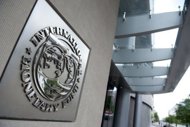IMF warns US against cutting deficit too fast

"Downside risks have intensified," IMF managing director Christine Lagarde said at a news conference, citing external pressures from the eurozone debt crisis and its potential deterioration, and domestic issues linked to the debt ceiling and the fiscal cliff.
In an annual report on the world's largest economy, the IMF trimmed growth forecasts to 2.0 percent in 2012 and 2.3 percent in 2013, down a tenth point from April's estimates.
The slower growth outlook mainly was due to sluggish consumer spending, the key driver of gross domestic product activity.
"It is critical to remove the uncertainty created by the 'fiscal cliff' as well as promptly raise the debt ceiling, pursuing a pace of deficit reduction that does not sap the economic recovery," the fund report said.
The country's "tepid" recovery three years after exiting the Great Recession was under threat from the pre-programmed "fiscal cliff" combination of sharp spending cuts and tax increases at the year-end, and the need to raise the debt ceiling in the coming months.
The fiscal cliff is the result of Congress's failure to agree on a deficit reduction plan, resulting in mandated tax increases and spending cuts to take effect by January 1, 2013.
Congress remains deadlocked over how to avoid the mandated measures, and the political impasse was not expected to end before the November 6 presidential election.
The IMF warned that leaving the measures to take effect could force a US contraction early next year, slamming an already fragile world economy.
Lagarde highlighted that the US fiscal and debt issues have eroded confidence in the country.
"The domestic effect would be severe, with negative spillovers to the rest of the world," Lagarde said.
The IMF noted the nation's debt ceiling will need to be raised in early 2013, after a historic battle over the same issue in Congress last year roiled markets and cost the United States its coveted triple-A debt rating for the first time.
The looming debt crunch was "bringing back the risk of heightened uncertainty and financial market disruption," the Washington-based institution said, calling for the limit to be lifted as soon as possible.
The IMF criticized President Barack Obama's proposed fiscal 2013 budget, which calls for slashing the nation's deficit by three percentage points to about 5.5 percent of gross domestic product.
Even if as expected the deficit cutting is less than three points, the IMF warned that "this smaller reduction would be too rapid, given the weak economy."
"The composition of spending should be as growth-friendly as possible," the IMF said, suggesting a larger deficit of about 6.25 percent of GDP would be appropriate.
Moody's Analytics analyst Nate Kelly warned that the IMF's prescription on deficit reduction "will prove difficult if this year's elections do not change the current political landscape substantially."
Republicans, who seized control of the House of Representatives two years ago, adamantly oppose tax increases, while Obama's Democrats favor a mix of spending and tax cuts to get the economy back on a sustainable growth track.
The IMF called for spending on infrastructure, measures to ease the housing crisis, and worker training programs in the distressed labor market, where job growth has nearly stalled and the unemployment rate stands at 8.2 percent.
But the IMF emphasized that weak consumer spending, which accounts for about 70 percent of the economy, was expected to remain a key stumbling block to recovery.
"Consumption is expected to be held back by households continuing to repair their balance sheets amid a sluggish recovery of house prices" after the housing bubble collapsed six years ago, the report said.
What the stars mean:
★ Poor ★ ★ Promising ★★★ Good ★★★★ Very good ★★★★★ Exceptional
Related Contents
Latest News
More News
- France supports Vietnam’s growing role in international arena: French Ambassador (January 25, 2026 | 10:11)
- Foreign leaders extend congratulations to Party General Secretary To Lam (January 25, 2026 | 10:01)
- Russian President congratulates Vietnamese Party leader during phone talks (January 25, 2026 | 09:58)
- Worldwide congratulations underscore confidence in Vietnam’s 14th Party Congress (January 23, 2026 | 09:02)
- Political parties, organisations, int’l friends send congratulations to 14th National Party Congress (January 22, 2026 | 09:33)
- 14th National Party Congress: Japanese media highlight Vietnam’s growth targets (January 21, 2026 | 09:46)
- 14th National Party Congress: Driving force for Vietnam to continue renewal, innovation, breakthroughs (January 21, 2026 | 09:42)
- Vietnam remains spiritual support for progressive forces: Colombian party leader (January 21, 2026 | 08:00)
- Int'l media provides large coverage of 14th National Party Congress's first working day (January 20, 2026 | 09:09)
- Vietnamese firms win top honours at ASEAN Digital Awards (January 16, 2026 | 16:45)

 Tag:
Tag:




















 Mobile Version
Mobile Version